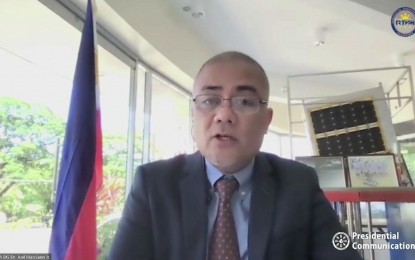
PhilSA director Joel Marciano Jr. (Screengrab from PCOO’s The Virtual Presser)
MANILA – The Philippine Space Agency (PhilSA) views international partnerships as an important part of the agency's mobilization and development, its chief said on Monday.
"As a young space agency, the PhilSA looks to international partnerships and agreements as an important part of our mobilization, and as a valuable means of accelerating our growth and development,” PhilSA director Joel Marciano Jr. said in a virtual presser.
Through partnerships, he said the PhilSA could learn many things from other countries' space programs.
Established in 2019 and mobilized in 2020, Marciano said PhilSA continues to build the local space ecosystem and strive to be a more active player in the global space economy.
"We recently forged two international partnerships on space cooperation with the United Nations Office for Outer Space Affairs (UNOOSA) and the Japan Aerospace Exploration Agency or JAXA," he said.
The official noted that the space cooperation agreement with the United Nations is PhilSA's first agreement on space cooperation with an international partner.
With the support of the Department of Foreign Affairs (DFA), the partnership aims to further strengthen the cooperation between PhilSA and UNOOSA in promoting the utilization of space for socio-economic and sustainable development objectives.
The partnership also promotes joint education, awareness, and outreach activities in international space law, policy, and the space economy.
PhilSA and JAXA's partnership, on the other hand, would explore the extent of cooperative work on space development activities that are of mutual interest and benefit on both sides.
The agency is looking forward to joint space scientific projects and people-to-people exchanges with JAXA experts over the long term, Marciano said.
These, he said, include potential cooperation activities in space applications, satellite development, space environment utilization, capacity building for space technology, policy and legislation; space science and space exploration, and space industry promotion.
JAXA has been a partner of the Philippines in space science, technology, and applications programs. Earlier, the Philippines, through the Department of Science and Technology, has collaborated with Japanese universities in the development and launch of the country’s microsatellites -- Diwata-1 and Diwata-2, and nanosatellites -- Maya-1 and Maya-2.
Recently completed Maya-3 and Maya-4 nanosatellites were turned over to JAXA last April and are set to be launched this year.
"We bring to these cooperation agreements our people and their experience from the Diwata and Maya satellites, along with our investments in ground infrastructure and capabilities for processing, analyzing and generating actionable information from spaceborne data," Marciano said.
Meanwhile, Marciano said amidst the pandemic, the PhilSA will continue to be more innovative and resourceful in bringing space-based and space-enabled solutions to help the nation with the challenges it is facing.
Earlier, Marciano said the PhilSA aims to contribute to the international community through scientific enterprise. (PNA)
